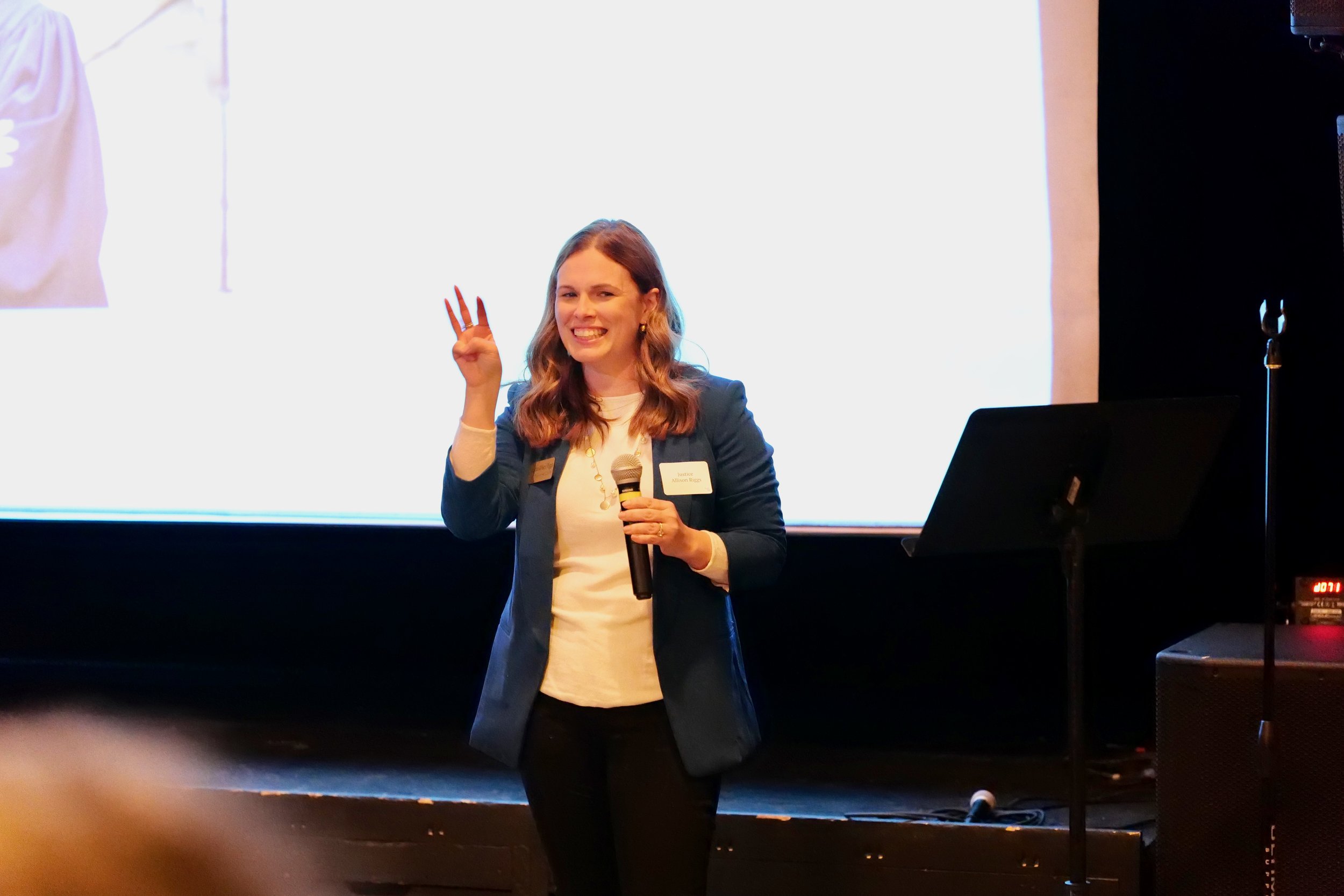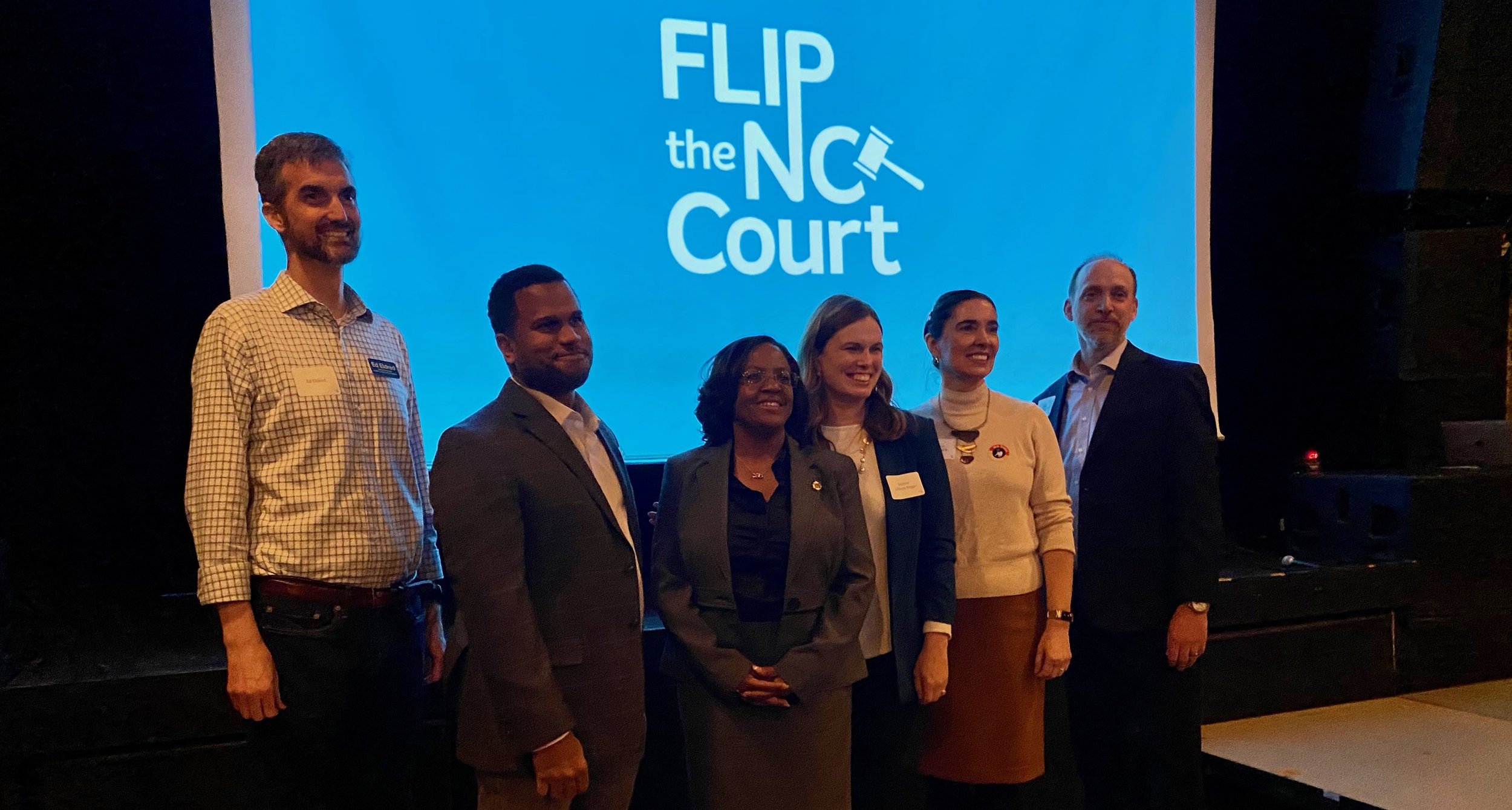We recently sat down with Justice Riggs, one of two Democrats on the N.C. Supreme Court, who is defending her seat in November’s election. In this portion of our wide-ranging conversation (don’t miss Parts 1, 2, and 4!), she discusses the role of the N.C. Court of Appeals, the fantastic Democratic candidates running to serve on that bench, and the plan to win back our statewide courts by 2028.
On why the Court of Appeals matters and how it affects North Carolinians’ everyday lives
I love talking about the Court of Appeals. I was honored to serve on it. I think my work as a justice on the Supreme Court is deeply informed by my experiences and learning on the Court of Appeals.
Our Court of Appeals is our intermediary appellate court. Our Court of Appeals is the workhorse of the state judiciary. It gets all of the criminal appeals first.
They get the most number of appellate cases. They hear many more cases than we do in the Supreme Court. And so criminal appeals, that are guaranteed as a right, go through the Court of Appeals first – and mostly get settled at the Court of Appeals.
All of our termination of parental rights cases – cases involving abuse, neglect, and dependency – those appeals go to the North Carolina Court of Appeals and have to be resolved quickly. Our Court of Appeals hears the same range of cases that we do in the Supreme Court, just more of them. And a larger number of criminal cases and these kinds of family cases that are so important.
It's important to me to tell people about what our Court of Appeals does, what kinds of backgrounds are very helpful to have, and to help people understand the way it works. Our Court of Appeals has 15 judges. They sit in panels or groups of three. So you're constantly changing who you hear cases with, which is a great way to make sure things get done.
I loved my time on the Court of Appeals because I got to serve with different judges. I got to hear about what concerned them, what their legal issues were, and got to deliver some great law, I thought, for the people of North Carolina. So our Court of Appeals judges are so important for making sure that across the trial courts, across the state, that justice is being delivered with an even hand.
Our Court of Appeals does frequently serve as a pipeline to the North Carolina Supreme Court. Right now, three of the seven justices on the North Carolina Supreme Court have served on the Court of Appeals. On the trail, out in public, I talk about the importance of building that pipeline to the bench.
Justice Riggs talks about our state courts at FLIP NC’s 2024 launch party
On the path to winning back the state courts by 2028
The next three election cycles are going to be key to winning back our courts in the 2028 election, before the next round of regular redistricting.
On the Supreme Court, we have to play defense for the next two election cycles, which is to say my seat is the only seat up out of seven this year. Justice Anita Earls’ seat is the only seat up in 2026. We're currently the only two Democrats on the North Carolina Supreme Court. We have to hold those seats.
In 2028, three Republicans’ terms are up, and that's it. We don't have to play any defense. So that right there is control of the North Carolina Supreme Court.
The Court of Appeals right now is 11 Republicans and 4 Democrats. We have to hold one seat on the Court of Appeals [in 2024]. Judge Carolyn Thompson is serving admirably, and she's going to be defending her seat. And then we have an opportunity to pick up two seats, elect two great Democrats – because two Republicans’ terms are up.
I know when I go out there, folks are frustrated when I tell them our courts matter, and we're not going to win back our courts this election cycle. And I need people to know and understand that there's going to be benchmarks and progress points that we hit where we're going to be able to celebrate the fact that we're willing to do things differently, talk differently about our courts; we're going to know that we're making progress. And so we're going to make progress on our Court of Appeals, and, in that 2028 election, win back both of those courts.
One of the reasons why I say that we need to win back our courts in the 2028 election, before the next round of regular redistricting, is that we'll take a new national census in 2030, and the state will draw new redistricting maps, new district maps for Congress, State House, State Senate in 2031.
Who we have on the bench in those 2028 elections is going to matter a lot to what democracy looks like after that next once-every-10-years census.
2024 NC Court of Appeals candidates Ed Eldred, Martin Moore, and Judge Carolyn Thompson with Justice Riggs, Justice Earls, and Court of Appeals Judge Toby Hampson at FLIP NC’s 2024 launch party
On this year’s Democratic Court of Appeals candidates
I'm so excited to have this young, energetic slate of candidates running for the bench.
I have been so honored to get to know these incredible judges and judicial candidates.
Judge Carolyn Thompson has served her community in various ways for decades, on the district court, on the superior court, on the Industrial Commission – the governmental body that hears from injured workers and [decides] whether or not they're entitled to relief, to get them back on their feet and made whole.
Judge Thompson is from Granville County, which I think we all know Granville County is growing. It's increasingly politically important. She is a voice for that area [that is] stretching, starting to move east of the Triangle. I'm so excited that she brings to bear her deep experience in family law to a court that deals with so many issues facing families.
She's a preacher, too. She's a woman deeply driven by faith, and I believe her faith values align with a majority of North Carolinians. She’s working so incredibly hard to keep her seat, and we need her voice on that bench.
I also have been thrilled to get to know two fine young gentlemen who are running for the Court of Appeals.
One is a man named Ed Eldred from Carrboro. He is a man who's been representing parents in these cases implicating families and whether or not they get made whole, get to be reunified, get the supports they need to keep kids safe and families together. I think he's got the experience representing people in courts, understanding North Carolina’s changing laws and changing environment with respect to the opioid crisis, with respect to health care. He's got that recent experience that's going to allow him to be an incredible judge on the North Carolina Court of Appeals. He's clerked on the North Carolina Court of Appeals. He understands how it works.
And then Commissioner Martin Moore, an incredible young man. He just turned 36 years old, from Buncombe County. He was elected to the Buncombe County Commission last year. He unseated a Republican in that election. He's a man who knows how to talk to voters. He's a young, African-American former public defender. In case folks don't know, public defenders are the people who deliver on the promise that anyone who gets pulled into a criminal courtroom deserves and gets representation from a great attorney. And our public defenders’ system is frequently overworked and overwhelmed. Commissioner Moore has the perspective of where our legal system falls short sometimes in delivering on its constitutional promise. He's represented folks who have been pulled into a criminal justice system, sometimes multiple times, because of poverty, because of lack of education, because of lack of opportunity.
He's got that perspective that I've seen lend itself to great changes on the federal bench. President Biden has prioritized putting former public defenders on the bench because of their understanding of where our criminal justice system is not working the way it should be. Where things aren't even and fair from the very beginning. And where we, as appellate judges, have the discretion to right some wrongs.
I'm so excited to have this young, energetic slate of candidates running for the bench. We are committed to talking about serving in judicial office, educating folks about the courts, and communicating our values differently. I know that the right has prioritized getting young folks on the bench and serving and teed up to lead for decades.
That's what makes me so excited, so energetic to lift up our incredible Court of Appeals candidates, to talk about the perspectives that they bring to the bench that I think are underrepresented, but are critically important for where the work of the Court of Appeals is right now.
Read parts 1, 2, and 4 of our conversation with Justice Riggs.


